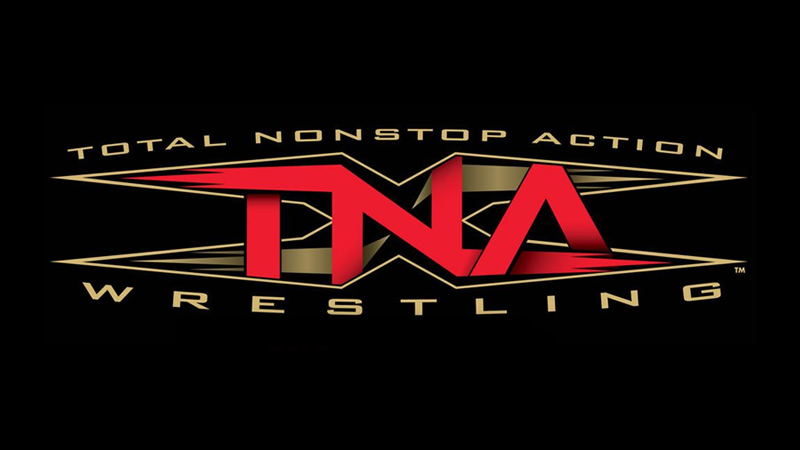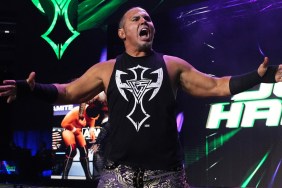TNA Victory Road 2011 is one of the most infamous pay-per-views in the history of professional wrestling. The main event world championship match between Sting and Jeff Hardy was eye-opening because the challenger, Hardy showed up to the event under the influence.
In a recent episode of his 83 Weeks podcast, former TNA executive producer Eric Bischoff looked back on the unforgettable night, and he offered his perspective as someone who witnessed the controversy unfold.
First, Bischoff stated that he could quickly tell that Hardy was in rough shape before the match.
“I could see from the distance I was at, I mean I’m not an expert on drugs, believe it or not, [but] I’ve seen enough of it from a distance and up close to recognize it,” said Bischoff. “Now it was a little tougher with Jeff because he had so much makeup on, you couldn’t really, it’s not like sitting across the table from somebody that’s about ready to face plant into a bowl of mashed potatoes, you know?”
Bischoff acknowledged that Hardy’s signature face paint made it difficult to get a read on his wellbeing, but one of the agents tipped him off.
“It wasn’t obvious to me, but what was obvious, and I think it was Pat Kenney, I could be wrong about this, but the agent, it’s the red flag because the agent looked at me like, ‘Woah, what the f—- are we gonna do?'”
The former WCW President then recapped the hectic minutes leading up to the match, and he stated that nobody knew where Hardy was. Once he came to gorilla position, Bischoff stated that he got a clear warning about Hardy’s condition.
“First of all, it took forever to find Jeff, so he was really late getting to gorilla, which is probably why I was in the proximity that I was in,” said Bischoff. “…When I saw Jeff approaching, I didn’t really notice Jeff being twisted up as much as I noticed the look on the agent’s face. And that’s kinda what brought me in closer to gorilla, just to try to figure out what the f—- is going on. Whoever the agent was essentially said, ‘He’s f—– up. He’s too f—– up to work. And then it became, Okay, who’s calling this?'”
Bischoff made it clear that while he was an on-screen authority figure, his true power was limited to the IMPACT Wrestling television show; he didn’t have any say in the pay-per-view.
“It wasn’t my job,” said Bischoff. “I was the executive producer of the television show, I technically had no authority whatsoever and no official role in the pay-per-view, unless I was a talent or unless I was asked to input on creative….So I’m kinda standing there, waiting for somebody to make a decision, and no decisions are being made.
“Now Jeff’s making his way out to the ring. Whoever was on gorilla, it wasn’t, and here’s the problem, it really wasn’t a person of authority.”
At this point in his retelling, Bischoff described how none of TNA’s authorities were present at gorilla position, so the stressful situation became even more chaotic.
“There was no captain of the ship in gorilla, and…I think Dixie [Carter] was close because she was, she was there, and it was my exchange with Dixie that was the catalyst for me to say, ‘F— it, nobody else is gonna do anything.’
“‘This s—, the bell’s gonna ring and it can’t go down like this.’ It was the show, I was concerned about the show. I didn’t want Sting going out there and trying to have a match with a guy who was completely f——- wasted. The match would have been the s—-, and I didn’t want Sting to be in that position. Sting didn’t know. He had no idea that Jeff was gonna show up f—– up. I’m looking for a decision, looking for somebody to come up with an idea. What do we do? Clock’s ticking. We don’t have a lot of time, folks. Can’t call a meeting. Somebody’s gotta call the ball. Who’s gonna call it? Crickets.
“F— it. I literally walked through the curtain not knowing what I was gonna do.”
Finally, the moment of truth had arrived. Hardy and Sting were in the ring, so the pay-per-view had reached the point of no return. As Bischoff tells it, he charged to the ring and tried to do his best to make the most out of a disastrous main event.
“There were two things that were crossing my mind,” said Bischoff. “And they were happening simultaneously. My first thought, because it seemed like the easiest, most direct line between A and B, is for me and my heel character to go out and just knock him out. Just drop him and have referee call the match and disqualification, and whatever we could come up with.
“But by the time I walked through the curtain, by the time I got halfway down the aisle, I realized that wouldn’t work because the No DQ thing. So I started improv-ing a story and laying out a promo. And what I was trying to do was buy time to figure out to communicate to both Jeff, the ref, and Sting. Because now I’ve got to rewrite the show while I’m in the ring, and the show’s happening, and one of the people in the match is completely disabled and not able to continue.
“So I did what I did. I basically told Jeff, ‘Take his finish, we’re gonna shorten this up, take his f—— finish. I went to Sting, now that’s where I had to get a little more creative because I was trying to talk to Sting at the same time [that] I was trying to cut a promo, and trying to hide it all and make it look like it was part of the show. But I basically told Sting, ‘Hit him with your finish, get him the f— out of here, let’s go home.'”
The rest is history. Sting pinned Hardy in less than two minutes, the fans booed the match out of the building, and TNA Victory Road 2011 went down as an unforgettable pay-per-view for all the wrong reasons.
The full clip is available here:
https://www.youtube.com/watch?v=TxSJqA-18oQ








